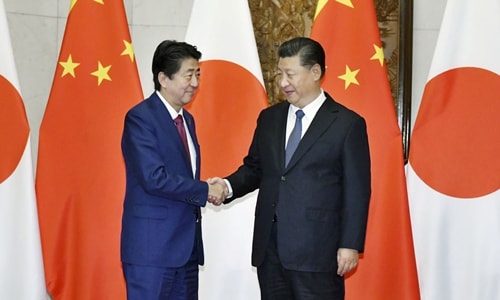Indifference to Deng Xiaoping's achievements under Xi Jinping
Although China is celebrating the 40th anniversary of reform, there are few activities honoring its founder, Deng Xiaoping.
|
Chinese President Xi Jinping (right) and Japanese Prime Minister Shinzo Abe in Beijing on October 26. Photo:Reuters. |
For the first time in years, Beijing's Tiananmen Square was covered with red and white Japanese flags. Japanese Prime Minister Shinzo Abe traveled to the Chinese capital with hundreds of Japanese businessmen, eager to sign the deal after years of hesitation.
The highlight of Abe's trip, which began on October 25, was a ceremony at Beijing's Great Hall of the People to mark the 40th anniversary of the 1978 Sino-Japanese peace and friendship treaty.
This year marks not only four decades since China and Japan pledged non-aggression, but also the 40th anniversary of “reform and opening up” – the groundbreaking economic policy of late Chinese leader Deng Xiaoping that led to China’s rapid economic growth and lifted hundreds of millions of people out of poverty.
In fact, this policy was closely linked to peace with Japan and the development aid that Tokyo began providing China in 1979. Two months before launching the economic policy, Deng Xiaoping visited Japan in late 1978 to finalize the treaty. He rode a bullet train and was amazed at its comfort and speed. “So fast!” he remarked.
China had closed its doors to the outside world after the Cultural Revolution of 1966-1976. To develop the country in the new era, Deng chose Japan as China's gateway to the West. He asked Japan to provide loans to develop China's poor economic infrastructure.
|
Deng Xiaoping (right corner) sitting on a bullet train in Japan in 1978. Photo:Jiji. |
However, the message in China on this 40th anniversary seems to be not to praise Deng Xiaoping too much, according to writer Katsuji Nakazawa ofNikkei. A scholar at a university in Beijing said: "Since last year, Chinese universities have considered holding a major event to celebrate. However, the government has not issued permits to hold the event."
At the Wangfujing bookstore in central Beijing, just a few minutes' walk from Tiananmen Gate, the layout seems to be designed to keep Deng Xiaoping out of the spotlight.
On a special shelf to commemorate the 40th anniversary of the reform and opening-up policy, the most prominent books are about Xi Jinping or Liu Shaoqi - a reform leader who was accused of "betrayal" during the Cultural Revolution and died in prison. He was later rehabilitated.
Meanwhile, books related to Deng Xiaoping, the policy's chief architect, were relegated to lower shelves.
The Central Committee of the Communist Party of China and other government-related agencies released a list of 100 outstanding private enterprises that have contributed to reform and opening up, including Alibaba Group Chairman Jack Ma and Tencent CEO Pony Ma. But one influential businessman who everyone knows is missing.
That is Wang Jianlin, chief executive of Dalian Wanda. Born in Sichuan province like Deng Xiaoping, Mr. Wang has transformed his real estate company into a conglomerate with interests in shopping malls, entertainment venues, Hollywood studios, and global cinema chains. Wang is said to have close ties to Deng’s family. Dalian Wanda has recently come under scrutiny from Chinese officials for its overseas acquisitions.
According to Nakazawa, Mr. Xi's coolness toward anything related to Mr. Deng stems from his declaration at last fall's Communist Party congress about the beginning of a "new era" led by Xi Jinping.
So Abe's visit this time is of great significance to Chinese President Xi Jinping. The fact that China no longer receives aid from Japan and that its economy has surpassed Japan's symbolizes the end of the Deng Xiaoping era. It is a good sign for Xi, who is trying to usher in his own new era.
In his vision, China cannot continue the policy of "hide and bide" that Deng Xiaoping set out. Mr. Xi's plan is to make China equal to the world's number one country: the United States.
However, Xi is facing a difficult situation in the trade war with the US. China's Politburo, the top policy-making body headed by Xi, issued a statement saying the economy was facing "growing downward pressure" amid "profound changes" in the external environment. This is the first time that China's leaders have publicly expressed concern about the country's slowing economic growth since the US imposed tariffs in June.
However, no major breakthroughs have been made between China and Japan following meetings between Xi and Abe or between Abe and Chinese Premier Li Keqiang. China’s import restrictions on Japanese food products, imposed after the 2011 Fukushima nuclear disaster, were supposed to be lifted but that has not happened yet.
Nakazawa believes that domestic political pressure has prevented Xi from making major concessions to Japan. Many scholars in China have openly questioned Xi’s ambitions. Some say that Xi’s unabashed display of ambition to become a superpower on par with the United States since taking power has led to the current problems.
During his conversation with Abe, Mr. Xi often looked down at the table, as if reading from notes. He was careful in choosing his words.
"Forty years after the reform and opening-up policy was implemented, the Sino-Japanese relationship is at a critical juncture. But Abe's official visit to China reflects that Xi is facing troubles both at home and abroad," Nakazawa wrote.



